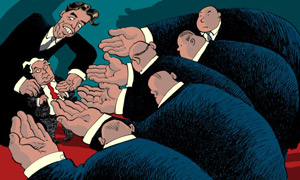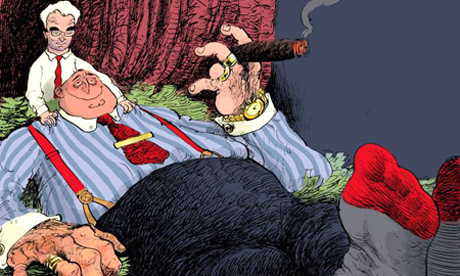 Fabulous audio treatment of the failings of the "free" market in yesterday's Guardian;
Fabulous audio treatment of the failings of the "free" market in yesterday's Guardian;the chief executives of Britain's five largest banking institutions - Barclays, HBOS, HSBC, Lloyds TSB and Royal Bank of Scotland - met the Bank of England. In the jargon of the City, they wanted governor Mervyn King to widen the types of collateral against which the Bank would lend to the clearing banks. In plain English, they wanted him to lend taxpayers' money against much flakier assets than would normally be considered acceptable.
Why did they need this handout? Because banks themselves had stopped lending each other money. The collapse of the US housing market, and the complex financial instruments that had been spun off from it, had caused chaos in the money markets. The victims of last year's "subprime crisis" included two of the world's most respected banks, America's Bear Sterns and France's BNP, while the "credit crunch" that followed claimed Britain's Northern Rock. Those banks that escaped unharmed were sure of only one thing: with so many of their peers exposed to incalculable risks, there was more bad news to come.
 But it doesn't end there;
But it doesn't end there;Speculation has left the global economy more vulnerable to a financial collapse than at any time since 1929. According to the supposedly sophisticated models used by market practitioners, a stock-market crash such as the one in 1929 was likely once in 10,000 years. They said the same, however, about the stock market crash of 1987, the collapse of the hedge fund Long Term Capital Management in 1998 and the subprime crisis. The obvious conclusion is that these models are flawed. The International Monetary Fund (IMF) recently described the crisis that erupted last August as "the largest financial shock since the Great Depression". George Soros, the billionaire speculator who knows a thing or two about financial upsets, says the world is facing the "most serious crisis of our lifetime".Extracted from The Gods That Failed: How Blind Faith in Markets Has Cost Us Our Future by Larry Elliott and Dan Atkinson


0 comments:
Post a Comment